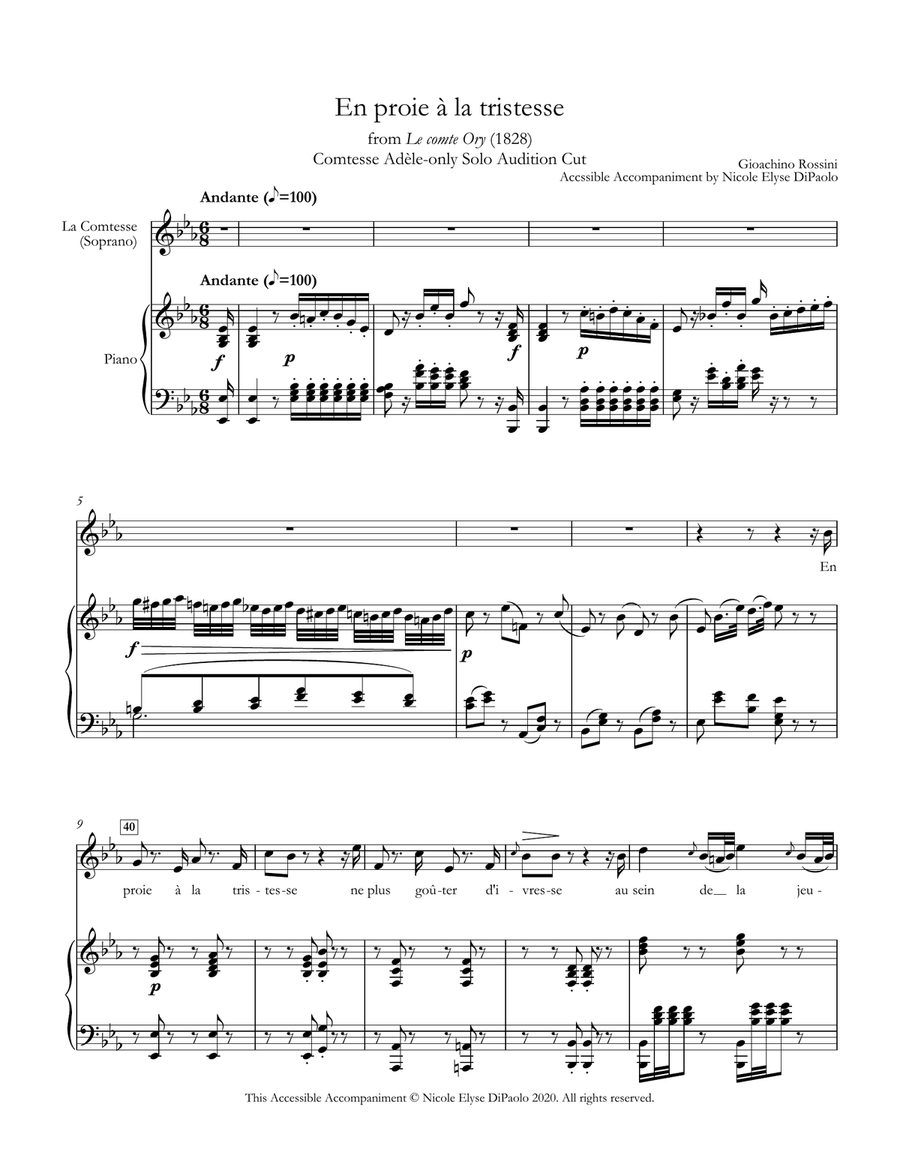Soprano voice,Vocal Solo - Level 5 - Digital Download SKU: A0.799619 Composed by Gioachino Rossini. Arranged by Nicole Elyse DiPaolo. Classical,Opera,Romantic Period. 13 pages. Nicole Elyse DiPaolo #5334741. Published by Nicole Elyse DiPaolo (A0.799619). The first of its kind, this is a customized Comtesse-only audition cut of En proie Ć la tristesse from Gioachino Rossini's Le comte OryĀ (1828). In the past, singers wishing to audition for this role would have to make a series of awkward cuts to eliminate the gaps created by the Comte and Isolier's lines, and deal with a needlessly inflated page count due to the choral parts, when performing this excerpt. The current edition omits andĀ condensesĀ those passages and, as a result, noticeably reduces the page countĀ toĀ 13. In addition, this new engraving is remarkably clearer than the existing French-language vocal score, which has deteriorated severelyĀ from age.The piano reduction itself has not been simplified or drastically altered (at the commissioner's request), although the engraving features minor changes from the original edition (for example, eliminating cross-staff chord notation, correcting someĀ obviousĀ typos, and reconciling details in theĀ RicordiĀ andĀ French editions).InĀ this edition,Ā the scoreĀ cutsĀ immediatelyĀ fromĀ 2 measuresĀ after rehearsalĀ 41Ā toĀ the beginning ofĀ rehearsalĀ 42Ā (so theĀ ComtesseĀ singsĀ the lastĀ syllableĀ of bonheurĀ onĀ theĀ first downbeat ofĀ cutĀ time and the C major/C minor sections are cut away completely).Ā This bringsĀ theĀ excerptĀ inĀ lineĀ withĀ mostĀ cavatina/cabalettaĀ numbersĀ thatĀ doĀ notĀ haveĀ aĀ discernibleĀ breakĀ inĀ betweenĀ theĀ two.About the Arranger:Ā Praised as a sensitive pianist and outstanding accompanist who delivers powerful interpretations, Nicole Elyse DiPaolo enjoys a multifaceted career as a sought-after collaborative pianist, educational composer, arranger, coach, private teacher, and adjunct music professor. Currently based in the Cleveland area, Ms. DiPaolo has appeared as a concerto soloist with the Ambassador Chamber Players on multiple occasions and as a recitalist, collaborator, and presenter worldwide. Currently, Ms. DiPaolo is an online Adjunct Lecturer in Music at Indiana University; the Principal Theory Teacher at Liberty Park Music, an online-only video subscription-based music school; an invited blog contributor and guest instructor at Tonebase; and a sought-after online instructor of piano, music theory, and composition who includes partimento and historical improvisation in her curricula.Ā For more information, please visit http://ndipaolo.musicaneo.com .
